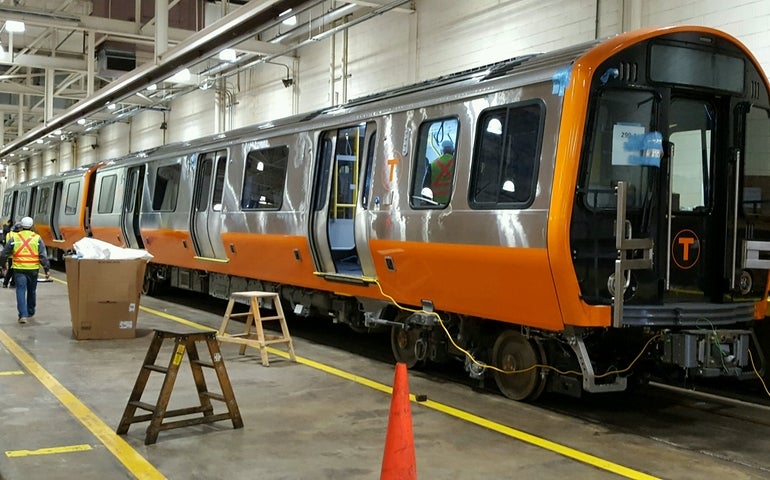MBTA electrification and safety reporting requirements feature as the most prominent parts of an infrastructure bond bill Gov. Charlie Baker wants to change with an amendment he returned to the Legislature.
Baker approved all of the bond authorizations in the nearly $11.4 billion bill he signed Wednesday, including $400 million for immediate safety improvements at the T and $275 million as a down payment toward a western Massachusetts passenger rail expansion, and several of the outside sections packed into the major legislation.
He struck language from a few line items, vetoed four outside sections and sent back five proposed amendments, many focused on additional guardrails lawmakers sought to impose around the MBTA amid upheaval at the agency.
One of Baker’s amendments would rework a section of the bill in which lawmakers called on the T to outline short-, medium- and long-term plans to transform the commuter rail system.
Instead of working to roll out “electric locomotive” service or pursue “electrification” on several lines in the near future, the MBTA would instead be ordered to implement “battery electric locomotive” service and “battery electrification” under Baker’s amendment.
“I support this planning to make the commuter rail system more productive, equitable and decarbonized,” Baker wrote in his amendment letter. “I am proposing changes to ensure the plans incorporate the most up to date technology.”
The original bill also called for “no agreement to purchase commuter rail trains” to involve diesel locomotives after Dec. 31, 2030. Baker’s amendment dropped that requirement.
Two other amendments Baker returned would also reshape mandates on the MBTA linked to the ongoing, intertwined safety and staffing crises.
Lawmakers added language to the bond bill requiring the T to file a monthly report with the state inspector general listing all recent “incidents, accidents, casualties and hazards” across the transit system. The MBTA would also need to make that information available publicly.
Supporters said the bolstered reporting requirements would address the Transportation Committee’s early findings as the panel probes failures at the T and as the Federal Transit Administration continues a nearly unprecedented safety investigation.
“There will be more as the committee continues, but as a result of the oversight process initiated by the speaker and Senate president, there are important changes in this bill already and no doubt there will be more,” Transportation Committee Co-chair Rep. William Straus said last month.
Under Baker’s amendment, the MBTA would instead be ordered to file a monthly “safety data analysis report” that “contains safety performance indicators for bus, heavy rail and light rail.” He said that would “streamline” the requirement and “align” it with information the T already needs to submit to the Department of Public Utilities, the FTA, the MBTA’s board of directors, the National Transit Database and the inspector general.
“This change will allow for consistent and comprehensive safety data analysis in a single report,” he said.
Baker also moved to change a section of the bill requiring the MBTA to submit regular reports with the Legislature summarizing its unfilled job positions, recent hires and how long new workers will need to be trained.
The bill called for those reports to be filed “not more than 1 week after the effective date of this act and monthly thereafter.” Baker’s amendment would narrow their scope slightly, focusing only on openings and recent hires without the training element, and would call for their submission “not more than 1 month after the effective date of this act and monthly thereafter.”
Staffing shortages at the MBTA have strained both service and safety, leading to trip frequency cuts and drawing warnings from federal investigators that a stretched-too-thin workforce puts riders and employees at risk.
Another Baker amendment would expand a proposed mobility pricing commission, which lawmakers tasked with studying and making recommendations on measures such as congestion pricing and public transit fares, by eight members.
The new seats would be filled by representatives of AAA, Construction Industries of Massachusetts, American Council of Engineering Companies, Trucking Association of Massachusetts, Retailers Association of Massachusetts, Massachusetts Restaurant Association, Massachusetts Health and Hospital Association and the hospitality industry.
With his veto pen, Baker slashed sections of the bill requiring the MBTA to provide “adequate parking alternatives” when it demolishes or reconstructs a parking lot or garage based on 2019 ridership levels and exempting car-sharing organizations from a rental vehicle surcharge.
The bill aims to maximize the impact of a new federal infrastructure law, which will steer billions of dollars to Massachusetts in the coming years and make more available via competitive grants, while upgrading transportation resources across the state and accelerating the transition toward electric vehicles.
It features $2.8 billion for projects on the interstate and non-interstate federal highway system, $1.375 billion for transit and rail improvements, $1.27 billion for non-federally aided road and bridge projects and tens of millions of dollars more for multimodal transportation planning, regional transit network improvements and Complete Streets funding for municipalities.
“MassTRAC will invest $11.4 billion in the Commonwealth’s roads, bridges and environmental infrastructure through proven, existing programs, including Complete Streets and the Municipal Small Bridge program,” Baker said in a statement Wednesday. “The bill will also advance major projects in cities and towns across the state by providing matching funds that will allow Massachusetts to compete for funding through the federal Bipartisan Infrastructure Law. The MassTRAC bill includes many of the proposals our administration included when first filing the legislation, and I am grateful to our partners in the Legislature for continuing to support infrastructure investments in Massachusetts’ cities and towns.”

